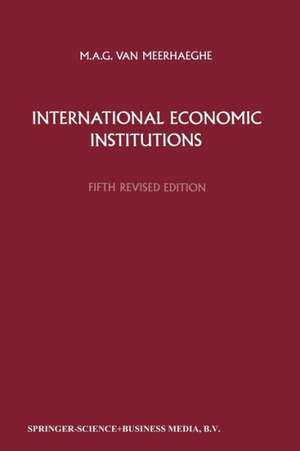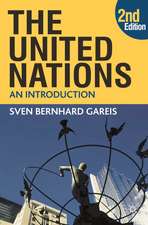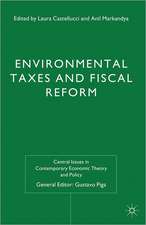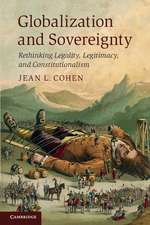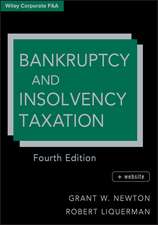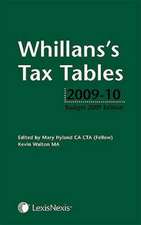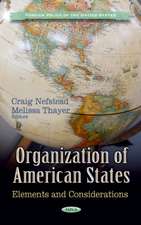International Economic Institutions
Autor M.A. van Meerhaegheen Limba Engleză Paperback – 3 oct 2013
| Toate formatele și edițiile | Preț | Express |
|---|---|---|
| Paperback (4) | 394.12 lei 6-8 săpt. | |
| SPRINGER NETHERLANDS – 3 oct 2013 | 394.12 lei 6-8 săpt. | |
| SPRINGER NETHERLANDS – 22 ian 2013 | 397.59 lei 6-8 săpt. | |
| Springer Us – 2 dec 2010 | 949.55 lei 6-8 săpt. | |
| SPRINGER NETHERLANDS – 21 sep 2012 | 1223.43 lei 6-8 săpt. | |
| Hardback (2) | 955.70 lei 6-8 săpt. | |
| Springer Us – 30 ian 1998 | 955.70 lei 6-8 săpt. | |
| SPRINGER NETHERLANDS – 30 noi 1991 | 1229.58 lei 6-8 săpt. |
Preț: 394.12 lei
Nou
Puncte Express: 591
Preț estimativ în valută:
75.42€ • 77.92$ • 62.77£
75.42€ • 77.92$ • 62.77£
Carte tipărită la comandă
Livrare economică 26 martie-09 aprilie
Preluare comenzi: 021 569.72.76
Specificații
ISBN-13: 9789401719322
ISBN-10: 9401719322
Pagini: 400
Ilustrații: XXVIII, 368 p. 2 illus.
Dimensiuni: 155 x 235 x 21 mm
Greutate: 0.56 kg
Ediția:Softcover reprint of the original 1st ed. 1987
Editura: SPRINGER NETHERLANDS
Colecția Springer
Locul publicării:Dordrecht, Netherlands
ISBN-10: 9401719322
Pagini: 400
Ilustrații: XXVIII, 368 p. 2 illus.
Dimensiuni: 155 x 235 x 21 mm
Greutate: 0.56 kg
Ediția:Softcover reprint of the original 1st ed. 1987
Editura: SPRINGER NETHERLANDS
Colecția Springer
Locul publicării:Dordrecht, Netherlands
Public țintă
ResearchCuprins
1: World Organizations.- 1. The International Monetary Fund.- 2. The World Bank Group.- 3. The General Agreement on Tariffs and Trade.- 4. The Commodity Agreements. The United Nations Conference on Trade and Development (UNCTAD).- 2: European Organizations.- 5. Benelux.- 6. The Organization for Economic Cooperation and Development.- 7. The Council for Mutual Economic Assistance.- 8. The European Communities.- 9. The European Free Trade Association.- Conclusion.
Recenzii
`...those readers who are looking for factual information in the field of international European and other regional organizations now have at their disposal a new and very useful survey of this world of abbreviations and what is behind it.'
De Economist, 133:4 (1985)
De Economist, 133:4 (1985)
Descriere
Descriere de la o altă ediție sau format:
What made me write this book was a feeling that students of international economics needed to fill out their knowledge of the theory with work on the practice of the major international economic organizations, many of which are having a growing influence on the national economies of their members. There was no single volume given over to a concise treatment of these organizations. The annual reports of the international organizations themselves can be consulted, of course, but as a rule these are not noted for being brief and to the point (the items of importance have to be fished out of a sea of useless detail), nor do they go in for criticism of their own activities. In selecting the organizations to be dealt with in the book I was guided by the influence they exert. I have left out those whose activities consist mainly in the drafting of recommendations to which, however meritorious they may be, little or no attention is paid. Some of them are included in the Introduction, which provides a summary of a number of institutions not discussed separately in the body of the work. There are, however, two exceptions: the Organization for Economic Cooperation and Development (OECD) as the organization replac ing the Organization for European Economic Cooperation (OEEC), and the United Nations Conference on Trade and Development (UNCTAD) whose meet ings have succeeded in drawing much attention of the press.
What made me write this book was a feeling that students of international economics needed to fill out their knowledge of the theory with work on the practice of the major international economic organizations, many of which are having a growing influence on the national economies of their members. There was no single volume given over to a concise treatment of these organizations. The annual reports of the international organizations themselves can be consulted, of course, but as a rule these are not noted for being brief and to the point (the items of importance have to be fished out of a sea of useless detail), nor do they go in for criticism of their own activities. In selecting the organizations to be dealt with in the book I was guided by the influence they exert. I have left out those whose activities consist mainly in the drafting of recommendations to which, however meritorious they may be, little or no attention is paid. Some of them are included in the Introduction, which provides a summary of a number of institutions not discussed separately in the body of the work. There are, however, two exceptions: the Organization for Economic Cooperation and Development (OECD) as the organization replac ing the Organization for European Economic Cooperation (OEEC), and the United Nations Conference on Trade and Development (UNCTAD) whose meet ings have succeeded in drawing much attention of the press.
